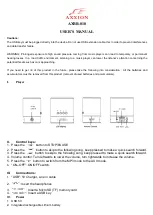
Electrical Maintenance
85
Flywheel Sensor
The flywheel sensor is in the engine bell housing
adjacent to, but not touching, the flywheel
(backed off 1/2 turn).
The flywheel sensor is a device containing an
inductance coil and magnet. When the magnetic
field is distorted by the passing ring gear teeth, the
inductance coil generates an ac electrical signal.
The signal has a voltage and frequency variation
proportional to the engine rpm.
The timing of the starter disengagement can be
precisely controlled by monitoring the frequency
of this signal with the starter disconnect module.
The starter may not disengage or engage properly,
if the flywheel sensor fails.
Testing the Flywheel Sensor
Equipment required:
•
AC voltmeter capable of reading up to 10
volts
•
Ohmmeter
•
SG unit for installing the sensor in the
threaded hole in the flywheel housing.
To test the flywheel sensor:
1. Install the flywheel sensor into the threaded
hole in the flywheel housing of an SG unit
until it contacts the ring gear.
2. Back out the sensor 1/2 turn and tighten the
locknut.
3. Disconnect wires FS1 and FS2 from the
sensor.
4. Start and operate the unit.
5. Check the ac voltage output across the sensor
terminals. Use a meter with a high ohms per
volt internal resistance. A Simpson 260, Fluke
digital or any good VOM will work. However,
an automotive type meter may not give an
accurate reading because the meter may load
the circuit heavily and cause the voltage level
to appear lower than actual. The output
voltage should be 1.5 to 2.0 Vac.
NOTE: If the voltage is slightly off, the
voltage may be increased by turning the
sensor in more. The voltage may be lowered
by turning the sensor out more.
6. Reconnect FS1 and FS2 wires on flywheel
sensor.
The sensor may be considered good if the
flywheel sensor passes the above test. If a unit is
not available, an alternate but less reliable test
may be performed as follows:
1. Disconnect the sensor from all wires.
2. Measure the resistance across the terminals.
The resistance should be 250 to 300 ohms
across the terminals.
3. Measure the resistance from each terminal to
the aluminum case. There should be no
continuity from each terminal to the case.
Figure 48: Flywheel Sensor with Wiring and
Schematic Symbols
1.
Flywheel Sensor
Figure 47: Flywheel Sensor Location
1
AXA0288
Summary of Contents for SGCO 3000
Page 4: ......
Page 12: ...SGCO 3000 Genset Addendum 12...
Page 14: ...Genset Model Features 14...
Page 22: ...Service Guide 22...
Page 32: ...Unit Description Features Options 32...
Page 78: ...Operating Instructions 78...
Page 86: ...Electrical Maintenance 86...
Page 114: ...Engine Maintenance 114...
Page 124: ...Alternator Operation and Diagnosis 124...
Page 130: ...Structural Accessory Maintenance 130...
Page 138: ...Index 138...
Page 140: ...Electrical and SG Menu Flow Diagrams 140...
Page 141: ...141 SGCO 3000 Wiring Diagram Page 1 of 1...
















































